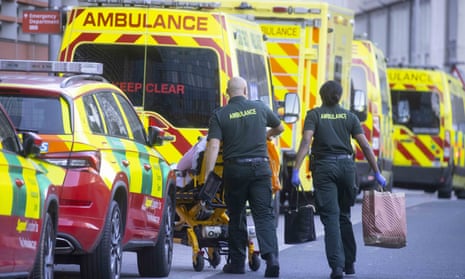Downing Street should not wait for hospitals to start being overwhelmed by Omicron coronavirus cases before moving to “plan B”, senior doctors and NHS leaders have warned.
Any delay in ramping up measures to limit the spread of Covid-19 would be “bizarre” and risk further adding to Britain’s already high death toll from the disease, one leading doctor said.
Health experts criticised No 10’s insistence on Tuesday that it would only implement plan B once a spike in cases linked to the new Covid variant had led to more people being admitted to hospital.
“This would be a bizarre approach, which if adopted risks the government once again acting too late and risking lives unnecessarily,” said Dr Paul Donaldson, a microbiologist and the general secretary of the Hospital Consultants and Specialists Association.
Donaldson added: “The litmus test on plan B, which means simple measures such as working from home and extending social distancing, must at the very least be a sustained increase in hospitalisations – but before crisis levels are reached.
“Acting once a crisis is reached would be completely self-defeating and would risk propelling us towards an NHS meltdown which then leads to yet another lockdown. Nobody wants that.”
Dr David Wrigley, deputy council chair at the British Medical Association, said: “As doctors working on the frontline we can categorically say that the NHS and the wider health service are already overwhelmed. Waiting until the NHS collapses entirely is the worst decision that could be made and further risks patients’ lives.”
They were responding to a Downing Street spokesperson who, when asked in what circumstances plan B would be introduced, replied: “Plan B remains an option we could introduce if the NHS starts to become overwhelmed and cases have increased.
“I think it is important to understand that [it is] a variant of new characteristics, not seen anywhere in the world before – rightly, people first need to take a precautionary approach and then look at the evidence that we get before deciding what approach would be the right one to take. I would emphasise that while there are some concerning characteristics, we simply don’t know enough yet.”
Dr Nick Scriven, a past president of the Society for Acute Medicine, said: “This sounds really scary and not what is needed. By the time data has been collected and then looked at it by whoever, it will be far too late to prevent infections and admissions.
“The factor that seems to have been forgotten is that admissions lag behind infection by five to 10 days so we need to decide at least partially on rising infection and not just hospital admissions.”
Under plan B ministers would recommend a return to widespread working from home, the use of vaccine passports, and mandatory wearing of masks in many settings.
Bodies representing heads of NHS trusts in England urged ministers to take action immediately to avoid already hard-pressed hospitals becoming overwhelmed with Covid patients.
Matthew Taylor, chief executive of the NHS Confederation, said: “Health leaders expect the government to act decisively to prevent an NHS crisis and not once it is too late, as this is what their patients and their hardworking teams deserve.
“As it stands, hospitalisations owing to coronavirus are nowhere near what they were at the start of the year. However, if we are serious about supporting the NHS to tackle the growing waiting list and about stopping broader healthcare services from being overly disrupted this winter, then we cannot be complacent.”
Saffron Cordery, deputy chief executive of NHS Providers, said: “We have consistently urged the government to take a precautionary approach. These are particularly difficult and complex judgments in the context of a new variant, but it is important to be clear about the need to avert such a scenario rather than respond to it.”
